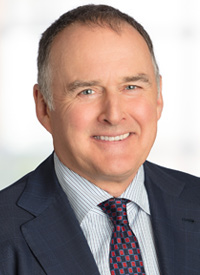OTHER NEWS
The Learning Center
Our Learning Center ensures that every reader has a resource that helps them establish and maintain a competitive advantage, or leadership position. For instance, loan originators and brokers will have one-click access to resources that will help them increase their productivity. Search topics by category and keyword and generate free videos, webinars, white papers and other resources. If you would like to add your content to the learning center, please click here or email Tim Murphy at [email protected].

matt
Sloan Steps Down as CEO of Wells Fargo
- Wednesday, 27 March 2019

Timothy J. Sloan, has resigned as CEO, president and member of the board at Wells Fargo & Co., due to controversy surrounding a sales practices scandal.
On a conference call Thursday, analysts were unsuccessful in their attempts to receive a direct answer to whether regulators had had forced Sloan to resign, or even whether criticism from the Comptroller of the Currency had surprised the bank. Nonetheless, the Office of the Comptroller of the Currency and the Federal Reserve, criticized the bank in recent weeks.
Allen Parker, general counsel Wells Fargo, has been appointed interim CEO, president and member of the board. An external search for a new CEO and president is beginning.
[adbutler zone_id="326324"]
[adbutler zone_id="326327"]
“Tim Sloan has served Wells Fargo with pride and dedication for more than 31 years, including in his role as CEO since October 2016,” said Betsy Duke, board chair at Wells Fargo. “He has worked tirelessly over this period for all of our stakeholders in the best long-term interest of Wells Fargo. His decision, and today’s announcement, reflect that commitment and his belief that a new CEO at this time will best position the company for success.”
[caption id="attachment_11376" align="alignleft" width="239"] Sloan steps down as CEO of Wells Fargo.[/caption]
Sloan steps down as CEO of Wells Fargo.[/caption]
“In my time as CEO, I have focused on leading a process to address past issues and to rebuild trust for the future,” said Sloan. “It has become apparent to me that our ability to successfully move Wells Fargo forward from here will benefit from a new CEO and fresh perspectives. For this reason, I have decided it is best for the company that I step aside and devote my efforts to supporting an effective transition.”
With regard to the external search for a new CEO, and the interim CEO role, the board has a continuous succession planning process through which we it identifies potential successors within Wells Fargo. Although they are many talented executives within the company, the board has concluded that seeking someone from the outside is the most effective way to complete the transformation at Wells Fargo. The search will begin immediately.
Parker, 64, served as senior executive vice president and general counsel at Wells Fargo between March 2017 and March 2019. He was presiding partner at the law firm of Cravath, Swaine & Moore from January 2013 until December 2016.
He was responsible for the development and implementation of firm-wide strategy and day-to-day firm leadership, including financial analysis and reporting, business development, risk management and public relations.
While at Cravath, Parker also served as deputy presiding partner from January 2007 to December 2012 and as managing partner of the corporate department from January 2001 to December 2004. He joined Cravath in 1984 and was a partner from June 1990 to March 2017, and he was a member of the firm’s corporate governance and board advisory practice.
Deputy General Counsel Douglas R. Edwards will serve as interim General Counsel and join the company’s Operating Committee. A 24-year veteran of Wells, Edwards most recently led the global commercial and securities division of the legal department.
Read more...
Lower Rates Spurred Big Increase in Refis
- Thursday, 28 March 2019

Mortgage applications increased 8.9 percent from one week earlier,according to data from the Mortgage Bankers Association’s Weekly Mortgage Applications Survey for the week ending March 22.
The Market Composite Index, a measure of mortgage loan application volume, increased 8.9 percent on a seasonally adjusted basis from one week earlier. On an unadjusted basis, the Index increased 9 percent compared with the previous week. The Refinance Index increased 12 percent from the previous week. The seasonally adjusted Purchase Index increased 6 percent from one week earlier. The unadjusted Purchase Index increased 7 percent compared with the previous week and was 4 percent higher than the same week one year ago.
[caption id="attachment_8412" align="alignleft" width="144"] Joel Kan[/caption]
Joel Kan[/caption]
“The spring buying season is off to a strong start. Thanks to an unexpectedly large drop in mortgage rates following last week’s FOMC meeting, purchase applications jumped 6 percent and refinance applications surged over 12 percent,” said Joel Kan, MBA’s Associate Vice President of Economic and Industry Forecasting. “Rates dropped across all loan types, and the 30-year fixed-rate mortgage is now more than 70 basis points below last November’s peak. The average loan size increased once again to new highs for purchase and refinance loans, as borrowers with, or seeking, larger loans tend to be more reactive to the drop in rates.”
The refinance share of mortgage activity increased to 40.4 percent of total applications from 39.2 percent the previous week. The adjustable-rate mortgage share of activity increased to 7.8 percent of applications.
[adbutler zone_id="326314"]
[adbutler zone_id="326316"]
The FHA share of applications decreased to 9.3 percent from 10.4 percent the week prior. The Veterans Affairs share of total applications decreased to 10.4 percent from 10.6 percent the week prior. The Department of Agriculture share of applications remained unchanged from 0.6 percent the week prior.
The average contract interest rate for 30-year fixed-rate mortgages with conforming loan balances ($484,350 or less) decreased to 4.45 percent from 4.55 percent, with points decreasing to 0.39 from 0.42 (including the origination fee) for 80 percent loan-to-value ratio loans. The effective rate decreased from last week.
The average contract interest rate for 30-year fixed-rate mortgages with jumbo loan balances (greater than $484,350) decreased to 4.35 percent from 4.37 percent, with points increasing to 0.27 from 0.23 (including the origination fee) for 80 percent LTV loans. The effective rate decreased from last week.
The average contract interest rate for 30-year fixed-rate mortgages backed by the Federal Housing Administration decreased to 4.48 percent from 4.59 percent, with points decreasing to 0.48 from 0.50 (including the origination fee) for 80 percent LTV loans. The effective rate decreased from last week.
The average contract interest rate for 15-year fixed-rate mortgages decreased to 3.87 percent from 3.97 percent, with points increasing to 0.47 from 0.40 (including the origination fee) for 80 percent LTV loans. The effective rate decreased from last week.
The average contract interest rate for 5/1 adjustable rate mortgages decreased to 3.77 percent from 3.99 percent, with points increasing to 0.30 from 0.29 (including the origination fee) for 80 percent LTV loans. The effective rate decreased from last week.
Read more...
Fannie Mae Names Frater CEO
- Wednesday, 27 March 2019

Fannie Mae has appointed Hugh R. Frater as chief executive officer, with responsibility for setting the vision and strategic direction of the company. In addition to his role as CEO, Frater, who was interim CEO since the fall, remains on the board.
[caption id="attachment_11329" align="alignleft" width="149"] Hugh Frater[/caption]
Hugh Frater[/caption]
"Hugh's deep understanding of the housing and the financial services industries, broad experience, and strong leadership skills make him an ideal choice to lead Fannie Mae," said Jonathan Plutzik, chair of Fannie Mae's board. "Hugh's contributions as Interim CEO over the last several months demonstrate his commitment to strengthening the company and delivering value to our customers and partners. This appointment also provides continuity in Fannie Mae's leadership team as we fulfill our mission to provide liquidity and support to the mortgage market."
[adbutler zone_id="326314"]
[adbutler zone_id="326316"]
"I am honored with this opportunity to lead Fannie Mae and to play a part in the company's important contributions to the housing finance system," said Frater. "The Fannie Mae of today is customer focused, innovative, and committed to leading a housing finance system that is safe, sound, and sustainable for taxpayers and creditworthy borrowers of all income levels,” said Frater. ”I look forward to continuing to working with this outstanding leadership team to deliver on Fannie Mae's strategic priorities and transform the mortgage experience for our customers and partners."
Frater served as Fannie Mae's Interim CEO since October and he’s been on the board since 2016. He has held a number of executive and management roles throughout his career. Frater serves as non-executive chairman of the board at Vereit Inc. Also, he led Berkadia Commercial Mortgage LLC, a national commercial real estate company providing comprehensive capital solutions and investment sales advisory and research services for multifamily and commercial properties.
He served as chairman of Berkadia from April 2014 to December 2015 and as chief executive officer of of the company between 2010 and April 2014. Earlier in his career, Frater was an executive vice president at PNC Financial Services, where he led the real estate division, and was a founding partner and managing director of BlackRock Inc.
Read more...

